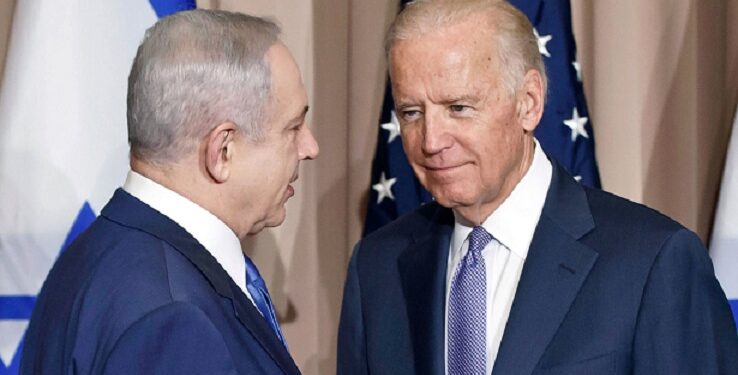Netanyahu feels betrayed by Biden after Gaza UN vote
The UN Security Council on Monday passed a resolution demanding a cease-fire in Gaza during the Islamic holy month of Ramadan, which began on March 11 and is set to end on April 9.
As many as 14 countries voted in favour of the resolution, presented by 10 elected members of the council, while the US abstained from voting.
The resolution called for an “immediate cease-fire for the month of Ramadan respected by all parties leading to a lasting sustainable ceasefire.”
READ ALSO: Mothers give birth to small, sickly newborns and stillbirths in Gaza – UN
It also demanded the “immediate and unconditional release of all hostages, as well as ensuring humanitarian access to address their medical and other humanitarian needs.”
Meanwhile, Israeli Prime Minister Benjamin Netanyahu on Monday called off an official visit for a top delegation to Washington after the passage of a UN Security Council resolution calling for an immediate cease-fire in the Gaza Strip, Turkish newswire, Anadolu, reports.
According to the Israeli public broadcaster, KAN, Netanyahu cancelled the delegation’s visit after the US abstained from using the veto against the resolution.
READ ALSO: Israel agrees to stop Gaza attacks for Ramadan, Biden says
A statement by Netanyahu’s office said the US decision to allow the resolution to pass is “a clear retreat from the consistent US position in the Security Council since the beginning of the war.”
The Israeli premier earlier threatened to cancel the delegation’s visit if Washington failed to veto the UN resolution.
The Israeli delegation was scheduled to visit Washington to hear US proposals for expanded humanitarian aid in Gaza, as well as alternatives to Israel’s planned ground attack in Rafah City in the southern Gaza Strip.
READ ALSO: Western diplomats try to stop Gaza war’s spread
The visit was announced following a phone conversation between Netanyahu and US President Joe Biden last week.
Israel has waged a deadly military offensive on the Palestinian territory since a cross-border attack by the Palestinian group Hamas in which some 1,200 Israelis were reported killed.
More than 32,333 Palestinians have since been killed and over 74,694 injured amid mass destruction and shortages of life’s necessities.
The Israeli war, now in its 171st day, has pushed 85% of Gaza’s population into internal displacement amid acute shortages of food, clean water and medicine, while 60% of the enclave’s infrastructure has been damaged or destroyed, according to the UN.
READ ALSO: ‘No homes, no hope’ for Gazans, says UN chief
Israel is accused of genocide at the International Court of Justice. An interim ruling in January ordered Tel Aviv to stop genocidal acts and take measures to guarantee that humanitarian assistance is provided to civilians in Gaza.
Overreaction?
U.S. officials said the Biden administration was surprised by Israel’s decision and considered it an overreaction, insisting there had been no change in policy.
Washington had mostly avoided the word “ceasefire” earlier in the nearly six-month-old war in the Gaza Strip and had used its veto power at the U.N. to shield Israel as it retaliated against Hamas.
But as famine looms in Gaza and amid growing global pressure for a truce in the war that Palestinian health authorities say has killed some 32,000 Palestinians, the U.S. abstained on a call for a ceasefire for the Muslim holy month of Ramadan, which ends in two weeks.
The challenge now for Biden and Netanyahu is to keep their differences from escalating out of control, analysts say.
READ ALSO: Israel agrees to stop Gaza attacks for Ramadan, Biden says
Jon Alterman, director of the Middle East program at the Center for Strategic and International Studies think tank in Washington, said there was no reason this should be a “mortal blow” to relations. “So I don’t think the door is closed to anything,” he said.
Signalling that the two governments remain in close communication, Israeli Defense Minister Yoav Gallant, on a visit separate from the one Netanyahu’s delegation scrubbed earlier, went ahead with high-level meetings in Washington on Monday.
But the U.S. abstention adds to a deepening rift between Biden and Netanyahu, who have known each other for years but have had a testy relationship even in the best of times.
READ ALSO: Hamas threatens to kill captives if Israel strikes civilians
Earlier this month, Biden said in an MSNBC interview that a Rafah invasion would be a “red line,” though he added that the defense of Israel is “critical” and there is no way “I’m going to cut off all weapons so that they don’t have the Iron Dome (missile defense system) to protect them.”
Netanyahu dismissed Biden’s criticism and vowed to press forward in Rafah, the last part of the Gaza Strip where Israeli forces have not carried out a ground offensive, though U.S. officials say there are no signs of an imminent operation.
That was followed last week with U.S. Senate Majority Leader Chuck Schumer, the country’s highest-ranking Jewish elected official, describing Netanyahu as an obstacle to peace and calling for new elections in Israel to replace him.






























